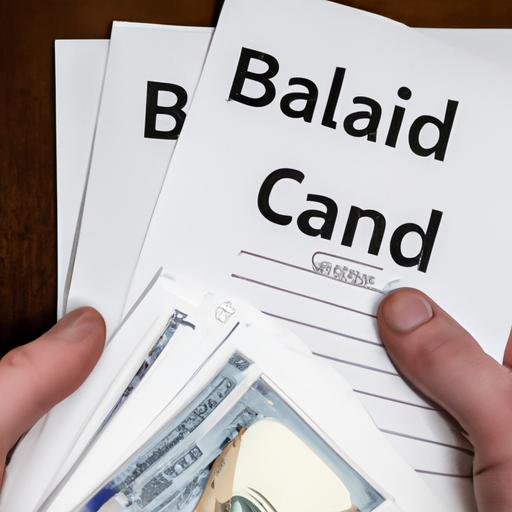Introduction
As we navigate through the peaks and valleys of financial stability, debt relief often becomes a topic of concern. We find ourselves pondering whether seeking debt relief options will have a detrimental impact on our credit scores. In this article, we will delve into the intricacies of debt relief and explore the question: “does debt relief hurt your credit?”
Debt relief, simply put, refers to the various methods available to manage and reduce your outstanding debts. It could involve negotiating with creditors, enrolling in debt management programs, or even filing for bankruptcy. However, one crucial aspect that often looms over these options is the potential impact on your credit score.
Your credit score is an essential financial indicator that reflects your creditworthiness. A good credit score opens doors to favorable interest rates, loan approvals, and other financial opportunities. Hence, it is vital to understand the relationship between debt relief and credit scores to make informed decisions about your financial future.
Stay tuned as we navigate through the world of debt relief, debunk common myths, and provide you with insights on minimizing the impact on your credit score. Together, we will explore the intricate balance between seeking financial relief and preserving your creditworthiness. So, let’s dive in and unravel the mysteries surrounding debt relief!
Understanding Debt Relief
Debt relief encompasses a range of options to alleviate your financial burdens. Let’s take a closer look at the different debt relief options available, the pros and cons associated with each, and their potential impact on your credit score.
Different Debt Relief Options
-
Debt Consolidation: This option involves combining multiple debts into a single loan or line of credit. By consolidating your debts, you simplify repayment and potentially secure a lower interest rate. However, it’s crucial to be diligent with payments to avoid further damage to your credit score.
-
Debt Settlement: Debt settlement entails negotiating with creditors to reduce the total amount owed. While this option can provide significant relief, it often requires a lump sum payment or a structured payment plan. Debt settlement may have a negative impact on your credit score, as it typically involves partial payment of your debts.
-
Debt Management Programs: These programs are offered by credit counseling agencies and involve creating a repayment plan tailored to your financial situation. Through debt management programs, you make a single monthly payment to the agency, which disperses funds to your creditors. This option can help you regain control of your finances, but it’s important to note that enrolling in such programs may be reflected on your credit report.
Pros and Cons
Each debt relief option comes with its own set of advantages and disadvantages. Debt consolidation simplifies repayment but may require collateral or a good credit score for approval. Debt settlement can significantly reduce your debt burden but may negatively impact your credit score. Debt management programs offer structured repayment plans but may have implications on your credit report. It’s essential to carefully weigh these pros and cons before deciding on the best debt relief option for your specific needs.
Impact on Credit Score
It’s important to acknowledge that debt relief can have short-term and long-term effects on your credit score. Initially, the debt relief process may lead to a temporary decrease in your credit score due to factors such as missed payments or negotiated settlements. However, over time, as you make consistent payments and demonstrate responsible financial behavior, your credit score can gradually improve.
In the next section, we will debunk the myth surrounding the impact of debt relief on your credit score. Let’s uncover the truth and gain a clearer understanding of the long-term consequences.
How Does Debt Relief Work?
Debt relief is a multi-step process that involves navigating through various options to find the most suitable solution for your financial situation. Understanding the workings of debt relief is crucial before embarking on this journey. Let’s take a closer look at the process and the steps involved:
Overview of the Debt Relief Process
The debt relief process typically begins with a thorough evaluation of your financial landscape. This assessment helps determine the severity of your debt situation and the most appropriate course of action. Debt relief options may include debt consolidation, debt settlement, or debt management programs.
Steps Involved in Seeking Debt Relief
-
Assessment: The first step is to assess your debt situation comprehensively. Calculate your outstanding debts, interest rates, and monthly payments to gain a clear understanding of your financial obligations.
-
Research: Once you have assessed your debts, conduct thorough research on various debt relief options. Understand the pros and cons of each approach to determine which one aligns best with your financial goals.
-
Consultation: Seeking professional advice is crucial during the debt relief process. Schedule consultations with reputable credit counselors or debt relief agencies to gain insights into your options and receive personalized guidance.
-
Decision-making: After gathering all the necessary information and expert opinions, make an informed decision about the debt relief option that suits your needs. Consider factors such as the impact on your credit score, the duration of the program, and any associated fees.
Key Considerations Before Choosing Debt Relief
-
Credit Score Impact: Understand that debt relief may have short-term effects on your credit score. However, the long-term benefits of getting your finances back on track often outweigh these temporary setbacks.
-
Financial Stability: Assess your ability to meet the requirements of the chosen debt relief program. Consider factors such as monthly payments, interest rates, and your overall financial stability.
-
Creditor Cooperation: Depending on the debt relief option chosen, your creditors’ cooperation may be necessary. Ensure you have a clear understanding of how your creditors will be involved in the process.
By familiarizing yourself with the debt relief process, its steps, and the key considerations, you will be better equipped to make informed decisions about your financial future. Remember, understanding the nuances of debt relief is the first step towards achieving financial freedom and protecting your creditworthiness.
Debunking the Myth: Does Debt Relief Hurt Your Credit?
Addressing Common Misconceptions
When it comes to debt relief, one prevalent misconception is that it inevitably leads to a significant drop in your credit score. However, this is not necessarily the case. While debt relief can have an impact on your credit score, it does not automatically spell doom for your financial reputation. It’s important to separate fact from fiction and understand the nuances involved.
Explaining the Short-Term and Long-Term Effects on Credit Score
In the short term, seeking debt relief options may cause a temporary dip in your credit score. This is primarily due to the adjustments and changes made during the process. For instance, if you opt for debt settlement, where you negotiate with creditors to pay a reduced amount, it may be reported as a partial payment on your credit report. This can affect your credit score initially.
However, in the long term, the impact on your credit score can vary. If you diligently follow the debt relief plan and make timely payments, it can actually help improve your credit score over time. As you pay off your debts and demonstrate responsible financial behavior, creditors and credit bureaus take note of your efforts, positively influencing your creditworthiness.
Factors that Influence Credit Score During Debt Relief
While seeking debt relief, it’s crucial to be aware of the factors that can influence your credit score. One factor is the type of debt relief option you choose. Some methods, like debt consolidation or debt management plans, may have a lesser impact on your credit score compared to others, such as bankruptcy.
Additionally, your payment history and the overall amount of debt you owe also play a significant role. Making consistent payments and reducing your debt load can help mitigate the impact on your credit score. It’s essential to maintain open communication with your creditors and credit counseling agencies to ensure accurate reporting and minimize any negative effects.
By understanding these factors and dispelling common myths, you can make informed decisions regarding debt relief while keeping your credit score in mind. Remember, while debt relief may have some temporary implications, it is within your power to rebuild and improve your credit over time. So, let’s move forward and explore ways to minimize the impact on your credit score during the debt relief process.
Minimizing the Impact on Credit Score
Debt relief can indeed have an impact on your credit score, but there are steps you can take to minimize the damage and rebuild your credit afterward. Let’s explore some strategies to navigate this process effectively.
Tips for Minimizing Credit Score Damage during Debt Relief
-
Stay Current on Payments: While undergoing debt relief, it is crucial to continue making timely payments on any remaining debts. This demonstrates your commitment to fulfilling your financial obligations and helps maintain a positive payment history.
-
Communicate with Creditors: Open communication with your creditors is key. Discuss your situation, negotiate payment plans, and explore options for reduced interest rates or alternative repayment arrangements. This can help prevent negative marks on your credit report and maintain a positive relationship with your creditors.
-
Avoid New Credit: While it may be tempting to open new lines of credit during debt relief, it is advisable to refrain from doing so. Taking on additional debt can further strain your financial situation and impact your credit score negatively.
Strategies for Rebuilding Credit after Debt Relief
-
Create a Budget: Establishing a well-structured budget helps you regain control of your finances. Allocate funds for essential expenses and set aside a portion for debt repayment. Consistently adhering to your budget will demonstrate responsible financial management and gradually improve your creditworthiness.
-
Secured Credit Cards: Consider obtaining a secured credit card to rebuild your credit. With a secured card, you provide a deposit that serves as collateral, reducing the risk for lenders. Make small purchases and pay off the balance in full each month to showcase responsible credit utilization.
-
Monitor Credit Reports: Regularly review your credit reports to ensure accuracy and identify any discrepancies. Report any errors promptly to the credit reporting agencies and follow up to have them corrected. Monitoring your credit reports also allows you to track your progress as you rebuild your credit.
Importance of Responsible Financial Management
Throughout the debt relief journey and beyond, responsible financial management is paramount. Adopting healthy financial habits, such as budgeting, saving, and practicing mindful spending, will not only aid in recovering from debt relief but also contribute to long-term financial stability.
Remember, rebuilding your credit takes time and patience. By implementing these strategies and maintaining financial discipline, you can gradually rebuild your credit score and set yourself on a path towards financial freedom.
Stay tuned for the conclusion of our exploration into the impact of debt relief on credit scores, where we summarize key insights and provide final thoughts on this crucial topic.
Conclusion
In conclusion, the question of whether debt relief hurts your credit is a complex one. While debt relief options can initially have a negative impact on your credit score, they also provide an opportunity for a fresh start and eventual credit score improvement. It is important to remember that the long-term benefits of debt relief often outweigh the short-term drawbacks.
By understanding the debt relief process, exploring various options, and being proactive in minimizing the impact on your credit score, you can navigate through financial challenges successfully. Remember to prioritize responsible financial management, make timely payments, and establish healthy financial habits to rebuild your credit score after seeking debt relief.
It is crucial to approach debt relief with a well-informed understanding of its implications. Seek professional advice, explore reputable debt relief programs, and always weigh the pros and cons before making any decisions. With the right approach, you can overcome financial hardships, reduce your debt burden, and ultimately improve your creditworthiness.
So, the next time you find yourself asking, “Does debt relief hurt your credit?” remember that while it may have temporary consequences, it is a stepping stone towards a brighter financial future. Take control of your debt, explore your options, and embark on a journey towards financial freedom.
Remember, your credit score does not define your worth. It is a reflection of your past financial decisions, and with the right strategies, you can shape a better financial future. Embrace the opportunities presented by debt relief, learn from your experiences, and pave the way for a stronger credit score.





